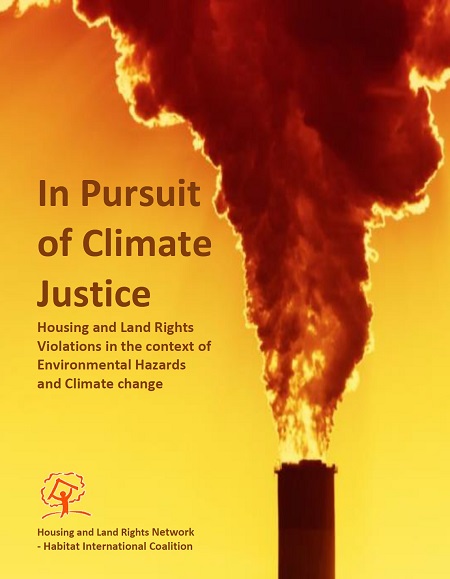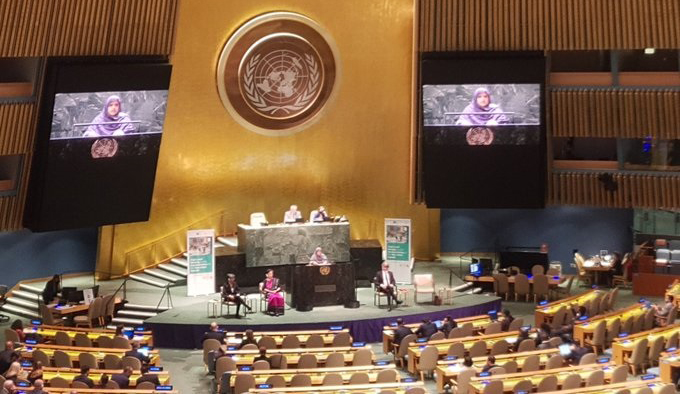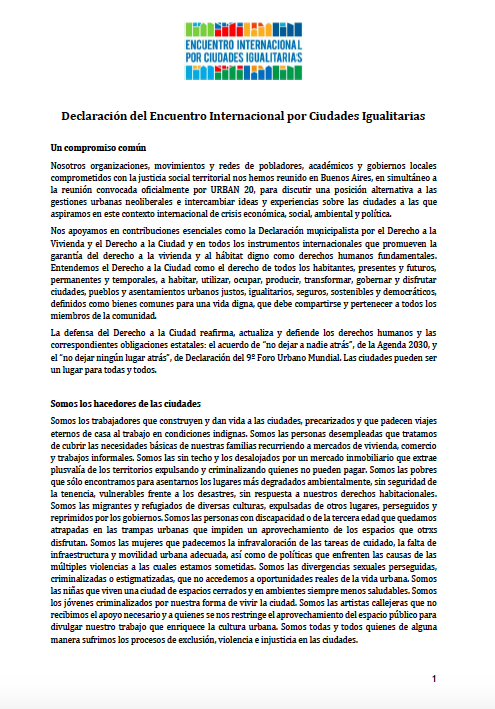HIC reaffirmed strategic focus include:
- Developing relationships inside and outside HIC, through advocacy, promotion, facilitative, supportive and direct action; and strengthening civil societys role in improving housing and settlement development.
- Strengthening peoples processes by supporting community based efforts to improve housing and settlements and alleviate poverty by assisting a broad range of peoples actions, addressing a set of core issues: housing, governance and poverty.
- Advocacy for recognition, defense and full implementation of housing rights, to improve the quality of life of the poor through improvement of housing conditions, in additional to income enhancement and social empowerment; and to move toward sustainable development.
PROMOTE THE SOCIAL PRODUCTION OF HABITAT
- Construct an integral strategy and an international integrated program of social production of habitat. Advocate for critical enhancement of the Cities without Slums initiative by advocating a rights based and people-centered, SPH approach in the allocation of ODA and other development funds by the Cities Alliance, World Bank, ADB, and other institutions, as an alternative to capitalist, market oriented development models. Advocate for establishment of city political and governance spaces. Advocate for improved living conditions for existing residents rather than their displacement by gentrification or “slum clearance,” and promote forms of land ownership and regularization which preserve affordability and maximize communal ownership, management and control. Oppose the “criminalization” of homelessness and poverty, linking this issue to the process of the right to the city.
- Continue monitoring by HIC membership and national and regional observatories to document the experience of different programs, actors and legislative processes pertaining to people centered development of habitat, and to monitor the activities of the government and private market investors in the real estate field. Facilitate the dissemination of Best Practices through recognition and awards. Learn from traditional forms of land use and tenure and deepen the debate about the role of private ownership of this resource.
REVISE MDG SLUM REDUCTION TARGETS
- Campaign to win explicit clarification that Target 11 of MDG 7 (reduction in the number of people living under slum conditions by 100 million by 2015) refers to a net reduction of people living under slum conditions (i.e., including prevention of the anticipated increase of 500 million more people living in slums), and to permanently redress the problems of those without homes in this context. Advocate for specific country targets for achieving Target 11 both for slum prevention and slum growth. Advocate with the IMF, World Bank and other institutions to treat all housing and sanitation funding as public capital investment, not expenditures, in each country’s budget.
HALT FORCED EVICTIONS AND PROMOTE HUMAN RIGHTS
- Campaign globally and at other levels against forced evictions and homelessness and their causes from globalization and the negative effects of privatization in all their forms (including policies of international agencies such as the IMF, WB, and ADB), and support political and social movements which oppose them (i.e. megaprojects, privatization of social housing and utilities). Specifically, utilize civil society and activist training, monitoring, advocacy, networking and media tools, including the HLRN toolkit, at all levels. Encourage global institutions and state and private duty holders to adopt legislation, programs and enforcement mechanisms, including use of the International Criminal Court, to realize housing and land rights. Formulate preventive strategies against forced evictions related with free trade agreements, regional plans for integration, and concrete mega-projects.
- Support civil society in confronting arbitrary and authoritarian regimes and failed or weak states through networking in the field (training and building capacity) and solidarity campaigns. In particular, denounce and oppose military occupation and violations of housing and land rights, including forced eviction and the destruction of habitat. Emphasize the economic, social and cultural rights of minorities and create special programs including activist training.
CAMPAIGNS AND NETWORKS
- Link HIC campaigns for housing and land rights and against forced evictions with campaigns for the right to water, sanitation and the right to the city as part of a holistic approach to urban and rural habitat.
- Deepen the relation of HIC within the World Social Forum and related activities (i.e. the process of the Charter for the Right to the City) and participate in the three decentralized global Forums in 2006.
- Promote participatory global monitoring and advocacy campaigns and exchange programs implementing these and other agendas such as Habitat II and Local Agenda 21 and prepare for upcoming events, such as the 30th Anniversary of HIC (i.e., Campaign on Land and Housing). Network with other global networks to achieve these goals.
- Mainstream a gender based approach and strengthen women’s leadership at all levels for influencing public policies. Change the concepts and the inherited cultures concerning violence against women in relation to housing and land rights and the right to the city. Strengthen the Women and Shelter Network and its participation in all HIC programs.


